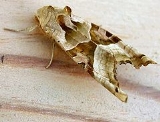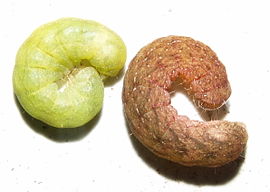
Angle Shades
Encyclopedia
The Angle Shades is a moth
of the family Noctuidae
. It is a common and familiar Europe
an species and is often strongly migratory.
This species has a wingspan
of 45-52 mm and the forewings are very distinctively shaped with a sharply pointed apex. The common name is derived from the characteristic markings on the forewings: the base colour is buffish, brown towards the termen
, and is marked with a bold v-shaped pink and green marking. Despite this bright colouring, the angular markings provide excellent camouflage against foliage. The hindwings are whitish with darker venation. Two broods are produced each year, and in the British Isles, the adults are on the wing from May to October . This moth flies mainly at night and is attracted to light and sugar. It may often be seen during the day at rest on fences and garden foliage.
 The larva
The larva
is green or brown with reddish spots along the sides and faint dark chevrons along the back. It feeds on a wide variety of plants (see list below). This species overwinters as a larva.
There is a similar related moth called the Small Angle Shades
, Euplexia lucipara.
Moth
A moth is an insect closely related to the butterfly, both being of the order Lepidoptera. Moths form the majority of this order; there are thought to be 150,000 to 250,000 different species of moth , with thousands of species yet to be described...
of the family Noctuidae
Noctuidae
The Noctuidae or owlet moths are a family of robustly-built moths that includes more than 35,000 known species out of possibly 100,000 total, in more than 4,200 genera. They constitute the largest family in the Lepidoptera....
. It is a common and familiar Europe
Europe
Europe is, by convention, one of the world's seven continents. Comprising the westernmost peninsula of Eurasia, Europe is generally 'divided' from Asia to its east by the watershed divides of the Ural and Caucasus Mountains, the Ural River, the Caspian and Black Seas, and the waterways connecting...
an species and is often strongly migratory.
This species has a wingspan
Wingspan
The wingspan of an airplane or a bird, is the distance from one wingtip to the other wingtip. For example, the Boeing 777 has a wingspan of about ; and a Wandering Albatross caught in 1965 had a wingspan of , the official record for a living bird.The term wingspan, more technically extent, is...
of 45-52 mm and the forewings are very distinctively shaped with a sharply pointed apex. The common name is derived from the characteristic markings on the forewings: the base colour is buffish, brown towards the termen
Glossary of Lepidopteran terms
This glossary describes the terms used in the formal descriptions of insect species, jargon used mostly by professionals or entomologist....
, and is marked with a bold v-shaped pink and green marking. Despite this bright colouring, the angular markings provide excellent camouflage against foliage. The hindwings are whitish with darker venation. Two broods are produced each year, and in the British Isles, the adults are on the wing from May to October . This moth flies mainly at night and is attracted to light and sugar. It may often be seen during the day at rest on fences and garden foliage.

Larva
A larva is a distinct juvenile form many animals undergo before metamorphosis into adults. Animals with indirect development such as insects, amphibians, or cnidarians typically have a larval phase of their life cycle...
is green or brown with reddish spots along the sides and faint dark chevrons along the back. It feeds on a wide variety of plants (see list below). This species overwinters as a larva.
There is a similar related moth called the Small Angle Shades
Small Angle Shades
The small angle shades is a moth of the family Noctuidae. It is distributed throughout Europe.As the common name suggests, this species is closely related to the angle shades , and is considerably smaller , but does not especially resemble that species...
, Euplexia lucipara.
Recorded food plants
- AeoniumAeoniumAeonium is a genus of about 35 species of succulent, subtropical plants of the family Crassulaceae.The name comes from the ancient Greek "aionos" ....
- AnemoneAnemoneAnemone , is a genus of about 120 species of flowering plants in the buttercup family Ranunculaceae in the north and south temperate zones...
- ApiumApiumApium is a genus of about 20 species of flowering plants in the family Apiaceae, with a subcosmopolitan distribution in Europe, Asia, Africa, South America and Australia. They are medium to tall biennial or perennial plants growing wet ground...
- Celery - BasilBasilBasil, or Sweet Basil, is a common name for the culinary herb Ocimum basilicum , of the family Lamiaceae , sometimes known as Saint Joseph's Wort in some English-speaking countries....
- Beta - BeetBeetThe beet is a plant in the Chenopodiaceae family which is now included in Amaranthaceae family. It is best known in its numerous cultivated varieties, the most well known of which is the purple root vegetable known as the beetroot or garden beet...
- Betula - BirchBirchBirch is a tree or shrub of the genus Betula , in the family Betulaceae, closely related to the beech/oak family, Fagaceae. The Betula genus contains 30–60 known taxa...
- BrassicaBrassicaBrassica is a genus of plants in the mustard family . The members of the genus may be collectively known either as cabbages, or as mustards...
- Centranthus - Red Valerian
- ChrysanthemumChrysanthemumChrysanthemums, often called mums or chrysanths, are of the genus constituting approximately 30 species of perennial flowering plants in the family Asteraceae which is native to Asia and northeastern Europe.-Etymology:...
- Cynara - Globe ArtichokeGlobe artichokeThe globe artichoke is a perennial thistle of the Cynara genus originating in Southern Europe around the Mediterranean. It grows to tall, with arching, deeply lobed, silvery, glaucous-green leaves long. The flowers develop in a large head from an edible bud about diameter with numerous...
- DahliaDahliaDahlia is a genus of bushy, tuberous, perennial plants native to Mexico, Central America, and Colombia. There are at least 36 species of dahlia, some like D. imperialis up to 10 metres tall. Dahlia hybrids are commonly grown as garden plants...
- Fragaria - StrawberryStrawberryFragaria is a genus of flowering plants in the rose family, Rosaceae, commonly known as strawberries for their edible fruits. Although it is commonly thought that strawberries get their name from straw being used as a mulch in cultivating the plants, the etymology of the word is uncertain. There...
- Geranium
- Hedera - IvyIvyIvy, plural ivies is a genus of 12–15 species of evergreen climbing or ground-creeping woody plants in the family Araliaceae, native to western, central and southern Europe, Macaronesia, northwestern Africa and across central-southern Asia east to Japan and Taiwan.-Description:On level ground they...
- HelianthusHelianthusHelianthus L. is a genus of plants comprising 52 species in the Asteraceae family, all of which are native to North America, with some species Helianthus L. is a genus of plants comprising 52 species in the Asteraceae family, all of which are native to North America, with some species Helianthus...
- Sunflower - Humulus - HopHop (plant)Humulus, Hop, is a small genus of flowering plants native to temperate regions of the Northern Hemisphere. The female flowers of H. lupulus are known as hops, and are used as a culinary flavoring and stabilizer, especially in the brewing of beer...
- LactucaLactucaLactuca, commonly known as lettuce, is a genus of flowering plants in the daisy family Asteraceae. The genus includes about 100 species, distributed worldwide, but mainly in temperate Eurasia....
- Lettuce - LamiumLamiumLamium is a genus of about 40-50 species of flowering plants in the family Lamiaceae, of which family it is the type genus...
- Deadnettle - MalusMalusMalus , the apples, are a genus of about 30–35 species of small deciduous trees or shrubs in the family Rosaceae. Other studies go as far as 55 species including the domesticated Orchard Apple, or Table apple as it was formerly called...
- Apple - Nicotiana - TobaccoTobaccoTobacco is an agricultural product processed from the leaves of plants in the genus Nicotiana. It can be consumed, used as a pesticide and, in the form of nicotine tartrate, used in some medicines...
- PelargoniumPelargoniumPelargonium is a genus of flowering plants which includes about 200 species of perennials, succulents, and shrubs, commonly known as scented geraniums or storksbills. Confusingly, Geranium is the correct botanical name of a separate genus of related plants often called Cranesbills. Both Geranium...
- PrunusPrunusPrunus is a genus of trees and shrubs, which includes the plums, cherries, peaches, apricots and almonds. There are around 430 species spread throughout the northern temperate regions of the globe. Many members of the genus are widely cultivated for fruit and ornament.-Botany:Members of the genus...
- Pyrus - PearPearThe pear is any of several tree species of genus Pyrus and also the name of the pomaceous fruit of these trees. Several species of pear are valued by humans for their edible fruit, but the fruit of other species is small, hard, and astringent....
- Quercus - OakOakAn oak is a tree or shrub in the genus Quercus , of which about 600 species exist. "Oak" may also appear in the names of species in related genera, notably Lithocarpus...
- RubusRubusRubus is a large genus of flowering plants in the rose family, Rosaceae, subfamily Rosoideae. Raspberries, blackberries, and dewberries are common, widely distributed members of the genus. Most of these plants have woody stems with prickles like roses; spines, bristles, and gland-tipped hairs are...
- Bramble - RumexRumexThe docks and sorrels, genus Rumex L., are a genus of about 200 species of annual, biennial and perennial herbs in the buckwheat family Polygonaceae....
- Dock - SenecioSenecioSenecio is a genus of the daisy family that includes ragworts and groundsels. The flower heads are normally rayed, completely yellow, and the heads are borne in branched clusters...
- SolanumSolanumSolanum, the nightshades, horsenettles and relatives, is a large and diverse genus of annual and perennial plants. They grow as forbs, vines, subshrubs, shrubs, and small trees, and often have attractive fruit and flowers. Many formerly independent genera like Lycopersicon or Cyphomandra are...
- Spinacia - SpinachSpinachSpinach is an edible flowering plant in the family of Amaranthaceae. It is native to central and southwestern Asia. It is an annual plant , which grows to a height of up to 30 cm. Spinach may survive over winter in temperate regions...
- StellariaStellariaStellaria is a genus of about 90-120 species flowering plants in the family Caryophyllaceae, with a cosmopolitan distribution. Common names include stitchwort and chickweed.-Food use:...
- Urtica - NettleNettleNettles constitute between 24 and 39 species of flowering plants of the genus Urtica in the family Urticaceae, with a cosmopolitan though mainly temperate distribution. They are mostly herbaceous perennial plants, but some are annual and a few are shrubby...
- ViciaViciaVicia is a genus of about 140 species of flowering plants commonly known as vetches. It is in the legume family . Member species are native to Europe, North America, South America, Asia and Africa. Some other genera of their subfamily Faboideae also have names containing "vetch", for example the...
- Vitis - GrapeGrapeA grape is a non-climacteric fruit, specifically a berry, that grows on the perennial and deciduous woody vines of the genus Vitis. Grapes can be eaten raw or they can be used for making jam, juice, jelly, vinegar, wine, grape seed extracts, raisins, molasses and grape seed oil. Grapes are also...

